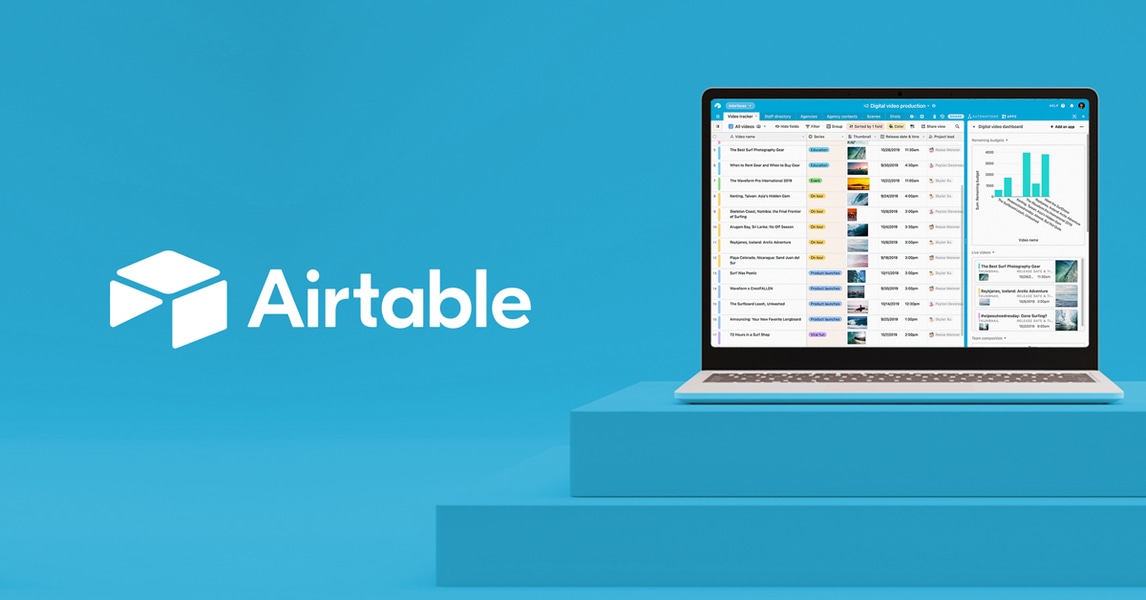
Table of Contents
Overview
Airtable has undergone a significant transformation, relaunching as an AI-native app platform that combines intuitive visual development with enterprise-grade reliability and scalability. This evolution introduces Omni, an AI app-building assistant, and Field Agents, which automate complex workflows and data processing tasks. The platform now offers AI capabilities across all plans, fundamentally changing how businesses create and deploy custom applications.
Key Features
Omni AI App Builder: A conversational interface that builds complete applications from natural language prompts, including databases, interfaces, and automations. Omni can switch seamlessly between app creation and data analysis, making it accessible to both technical and non-technical users.
Field Agents: AI-powered automation agents that operate continuously within bases to extract insights from documents, generate content, enrich data from web sources, and synthesize information from various inputs like call transcripts and customer feedback.
Production-Ready Infrastructure: Applications built on Airtable utilize enterprise-grade infrastructure with robust security, scalability, and reliability features suitable for critical business operations.
Visual Development Interface: The platform maintains its familiar grid-based interface while adding AI-enhanced capabilities for building sophisticated applications without traditional coding requirements.
Cross-Platform Integration: Native integration capabilities with popular business tools and APIs, enhanced by AI-powered data mapping and workflow automation.
How It Works
Users interact with Omni through natural language to describe their application requirements. The AI assistant then generates complete applications using Airtable’s production-tested components, ensuring reliability while maintaining the flexibility of conversational development. Field Agents operate autonomously within these applications, continuously processing data and triggering actions based on predefined criteria or real-time events.
The platform leverages existing Airtable infrastructure as a foundation, allowing AI-generated applications to benefit from proven scalability, security, and performance characteristics while enabling rapid iteration and customization through the visual interface.
Use Cases
Business Process Automation: Streamline complex workflows across departments, from employee onboarding to marketing campaign management, with AI agents handling routine tasks and decision-making processes.
Custom Internal Tools: Rapidly develop tailored solutions for inventory management, customer relationship tracking, and project coordination without requiring extensive development resources.
Data Analysis and Reporting: Deploy AI agents to continuously analyze large datasets, identify patterns, and generate actionable insights for strategic decision-making.
Content Creation and Management: Automate content generation workflows, from marketing materials to technical documentation, with AI maintaining brand consistency and quality standards.
Enterprise Application Development: Build scalable business applications that can handle complex data relationships and high-volume operations while maintaining enterprise security and compliance standards.
Advantages and Limitations
Strengths
AI-Enhanced Productivity: Intelligent automation significantly reduces manual work while accelerating business processes and decision-making capabilities.
Accessible Development: The conversational interface democratizes application development, enabling business users to create sophisticated solutions without programming expertise.
Enterprise Scalability: Built on proven infrastructure that supports large-scale operations with robust security, compliance, and performance characteristics.
Flexible Integration: Comprehensive connectivity options with existing business systems and third-party services through both native integrations and API access.
Current Limitations
Cost Considerations: AI features require additional subscription costs (\$6 per user monthly on Team plans and above), which can become significant for larger organizations.
Learning Curve: While user-friendly, maximizing the platform’s AI capabilities requires understanding of prompt engineering and workflow design principles.
Credit Usage Transparency: Limited visibility into AI credit consumption patterns makes it challenging to optimize usage and predict costs accurately.
Advanced Configuration: Fewer granular controls compared to direct API access for users requiring precise customization of AI model parameters.
Competitive Landscape
Modern Competitors Analysis
Notion: Has significantly enhanced its AI capabilities in 2024-2025, offering AI features at \$6-10 monthly with strong document-database integration and more affordable pricing structures.
Monday.com: Provides robust project management features with visual workflow tools, competitive pricing, and strong team collaboration capabilities particularly suited for structured project environments.
Smartsheet: Offers enterprise-focused project management with advanced reporting, Gantt charts, and traditional spreadsheet familiarity, appealing to organizations requiring formal project control methodologies.
Retool: Maintains advantages in developer-centric environments with sophisticated customization options, advanced scripting capabilities, and powerful API integrations for complex internal tool development.
Bubble: Provides full-stack no-code development with comprehensive design, data, and logic capabilities in a single platform, competing directly in the visual application development space.
Fibery: Specializes in product development workflows with strong entity relationship management and collaborative features tailored for startups and product teams.
Pricing Structure
Free Plan: Basic functionality with limited records and features
Team Plan: \$20-24 per user monthly with enhanced collaboration features
Business Plan: \$45-54 per user monthly including advanced administration tools
Enterprise Scale: Custom pricing for large organizations with dedicated support
AI Add-on: Additional \$6 per user monthly on Team plans and above, with bundled AI credits included across all plan levels.
Strategic Considerations
Airtable’s transformation positions it as a comprehensive platform for AI-enhanced business application development. The integration of conversational AI with proven database and workflow capabilities creates unique value for organizations seeking to democratize application development while maintaining enterprise-grade reliability.
However, organizations should carefully evaluate total cost of ownership, especially for larger teams, and consider whether the AI-enhanced features justify the premium over alternative platforms. The platform excels in scenarios requiring rapid application development with ongoing AI automation but may be oversized for simple project management or basic database needs.
For businesses ready to embrace AI-driven workflows and seeking a platform that can grow with their automation sophistication, Airtable’s AI-native approach offers compelling advantages. Organizations primarily focused on traditional project management or requiring extensive customization capabilities might find better value in specialized alternatives.

